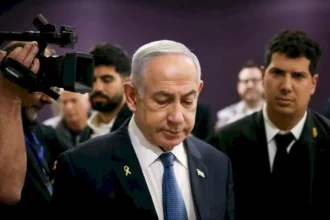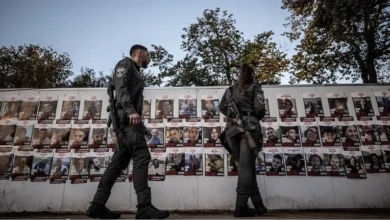Shocking remarks by Israeli finance minister: Israel delayed deploying troops to confront Hamas on Oct. 7 for several hours
Al-Khamisa News Network - Gaza

Israeli Finance Minister Bezalel Smotrich revealed shocking details about the events of October 7, 2023, saying that at 12:00 they did not send all forces south because they did not know whether it was a deception.
The remarks came in a special interview with the Hebrew newspaper Yedioth Ahronoth in the “7 Days” supplement, after Israeli Prime Minister Benjamin Netanyahu and U.S. President Donald Trump commented on the outlines of a deal, but before the agreement was signed.
Below is an excerpt from the interview, with the questions and answers as they were given:
Two months ago you posted a video saying: “I have lost confidence that Netanyahu can and wants to lead us to victory.” Do you still stand by that?
“Netanyahu led a very bad decision in August in the small ministerial war cabinet (the ‘Kabinett’), which stipulated that we would move into an exercise in Gaza, mobilize the entire army and enter the most densely populated city in the world with all that entails, while being ready to stop in the middle for a partial prisoner-exchange deal. In my view, that was something that should not have been accepted, neither security-wise nor morally. I said I support occupying Gaza and the central camps, and I told the prime minister: ‘Only if we go to the end.’ I’m glad my position was ultimately accepted, whether that was because I convinced by reason or because I activated political influence, and I’m not ashamed of that.”
What political influence? You have not resigned from the government to this day — what would have changed this time?
“I know how to activate the political influence I possess. Realistically, the prime minister announced there would not be a partial deal, and now we are talking about a comprehensive deal.”
So the claims of the families of the hostages and the opposition are correct. Netanyahu is acting based on political considerations about the survival of the government, not according to what he believes is right.
“I want to believe that this is what he thinks is the right thing to do. Hold on, that’s an entirely illegitimate question. The State of Israel is a democracy with a coalition system in which political players exercise political influence. That’s what the left does all the time. Why, when Benny Gantz sat in the War Cabinet after audaciously demanding my removal, was that legitimate? Is Gantz allowed to use his political power while Bezalel Smotrich is forbidden?”
Let’s talk for a moment about the body that is supposed to run this whole campaign. Does it seem right to you that the political and security Kabinett is made up of people who did not serve in the army, did not complete service, or did not serve in combat roles?
“I understand that the previous Kabinett, which included Yair Lapid (former prime minister and currently opposition leader), who was a journalist at Bamahane (military newspaper), and Merav Michaeli, whom I don’t know whether she served in the army at all and what she did (served in Army Radio – ed.), and Nitzan Horowitz who was also a correspondent at Army Radio or something like that, was acceptable at the time. Enough of this hypocrisy. I was a good transport minister without having been a bus driver before.”
Put aside the nonstop comparisons to previous governments. We are talking about a Kabinett serving in one of the hardest periods the state has known. We shouldn’t be naive all the time.
“The entire previous Kabinett together does not reach the level of experience that Netanyahu has in the Kabinett, nor Yisrael Katz and others. Even I, after two years of the war, already have experience that will take others years to acquire. We have a very good and critical but healthy dialogue between the army and the political level. Each side brings its relative advantage. There is an advantage to being a military man, and there is also a disadvantage to being a military man. Yisrael Katz, for example, as a civilian in my view makes a much better defense minister than Gallant, who was subject to the system.”
Nevertheless, your lack of experience seemed to show in your own admission that you did not know even on October 7 who ‘the elite’ were, you were not aware of the ‘Suleimani plan,’ and you did not know that the Houthis posed a threat to Israel. The ministers who heard you seemed to be in shock.
“I knew what ‘the elite’ was. I did not know what they were planning because there was a presentation called the ‘Jericho Wall’ that was buried with some intelligence official. The point was that I was not aware of the Hamas ground invasion plan, and it turns out that the chief of staff and the head of the southern command were not aware of it either. There were those who knew and buried it very deep in a drawer.”
“I’ll tell you more. I sat with the chief of staff (Herzi Halevi) five days before the war in my office. Two weeks before that we had deepened our work on the northern front, the Radwan force (of Lebanese Hezbollah), and planned our responses. I requested an urgent meeting with the chief of staff and told him: ‘Herzi, you are not heading in the right direction. You are treating Radwan as an infiltration by saboteurs, while you are actually facing a commando infantry brigade that will invade, and in response you need fortified positions, fortifications and firepower, as in the Yom Kippur War.’ He told me: ‘You know what? You are right, we have started to work on that, and it will take us a few months.’ In one discussion, when we began the maneuver in the north and were exposed to the huge scope of Hezbollah’s underground infrastructure, I asked the chief of staff: ‘Did we know?’ He said a very beautiful phrase: ‘We knew, but we were not aware.’ That is, like a drawing with many dots where you need to draw the line — we had the dots.”
“We did not realize the scale of the threat, certainly not in the context of a confluence of fronts. That is what we understood in the midst of the war. I still remember the moments on Simchat Torah (October 7). Between 11:00 and 12:00 I arrived at the Kirya (Defence Ministry headquarters). We were sitting there in the room — the prime minister, Yoav Gallant (then defense minister) and I — with the chief of staff on the phone, and we hesitated. We did not yet know whether the disaster in the south was just a deception created by Hamas to send all our forces south and then have Hezbollah attack us from the north. So we waited for a moment, and only when the intelligence arrived and we understood that it was not coordinated did we send all forces south.”
“We did not grasp the magnitude. But God in His grace gave us that slap — painful, difficult, the great disaster, with horrific and terrible results — but that slap woke us up after many years of slumber.”
It’s hard to forget how Smotrich spoke when he was in the opposition, during the Bennett-Lapid government. At that time the attacks led him to call for the government’s and its leader’s resignation — something he has not dared to think of since October 7 and the attacks that have taken place in Israel since the start of the war, and certainly has not said out loud. He seems to have trouble reconciling this contradiction to this day. Frankly, if you had been in the opposition and Naftali Bennett was prime minister on October 7 and the attacks we have experienced occurred under his term, what would Bezalel Smotrich have said about that government?
“First, unity. I would have put all differences aside and entered a unity government as Benny Gantz did. When there is a war like this, we put everything aside.”
If you were in the opposition during a security period when many people are killed, what would you say? “We are changing Israel’s security concept…”
You are avoiding the question.
“I am a practical person. When support is required, I support, and when attack is required, I attack.”
When you go to sleep at night, do you feel pangs of conscience?
“Not pangs of conscience, but a very heavy sense of responsibility. It happened on my watch. Everything I have done since then is to bear that responsibility. Whether in my influence on the courses of the war, or in managing the economy and supporting the front and the home front, and also by virtue of my responsibility toward the families and the framework that must be provided budgetarily for the displaced and the survivors. I opposed Oslo and the expulsions and demanded the occupation of Gaza in 2017 and warned for ten months in the Kabinett against the failed concept and that nonsense that ‘Hamas is deterred.'”






